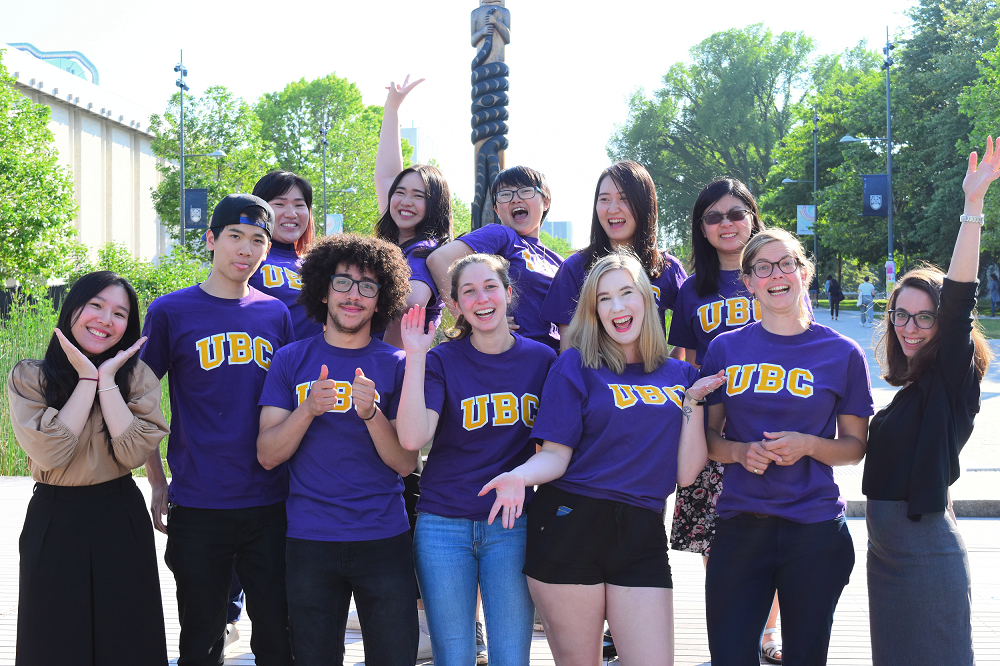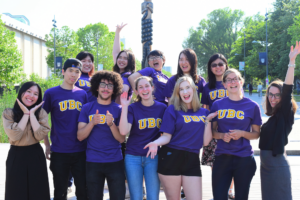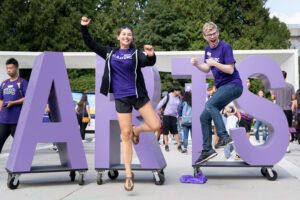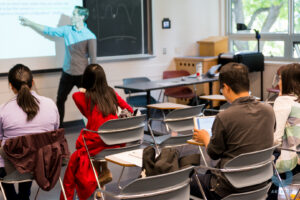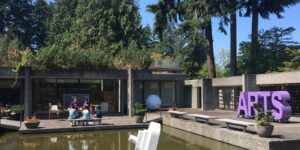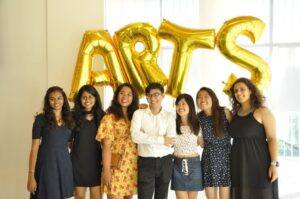Arts VSP is ideal for students interested in gaining international experience, meeting students from other universities and experiencing Canadian culture, while enhancing their learning experiences in one of the world’s top ranked universities. Students will enjoy university residence life and will have the opportunity to take part in events and field trips organized specifically for Arts VSP students.
What you might expect/course format
A typical course includes an interactive lecture and discussion component and will have a mix of in-class and take-home assignments. Assignments can also include individual or group projects, quizzes, and exams.
Some courses will offer academic field trips that take place on or off campus. These field trips complement classroom learning, and may include community engagement or fieldwork.
The Arts Vancouver Summer Program’s instructors and teaching assistants are committed to providing a supportive learning environment for students. During the program, instructors provide support in class and by email.
July 2025 Course Packages
May 1, 2025: This course package has reached its capacity and is no longer accepting applications.
From Drama to Theatre: How does a play mean? (Theatre)
This course will explore the languages of theatre within Vancouver’s rich and lively performance culture. How do individual artists–directors, actors, designers–transform a playwright’s ideas into unique and original art? In what ways, for example, will a Shakespeare play produced in Vancouver become a Canadian play? These questions and more will be explored in relation to two plays a week in production in Vancouver during the term. We will examine and discuss the play scripts, attend the plays, and meet “backstage” with some of the artists themselves. Plays chosen will span a variety of genres, including Shakespeare (in production at Bard on the Beach Shakespeare Festival), musicals (in production at Theatre Under the Stars and the Arts Club Theatre Company), plus additional dramas and comedies in production.
Documentary & the City (Film)
For the first time in human history a majority of the world live in cities. While there are multiple threats posed by the growth of cities, such as poverty, migration, and social divisions, there are also surprising and innovative practices that emerge. The city of Vancouver is brimming with stories that can tell us many things about the world we live in. Focusing on documentary films and film making, this course introduces students to these often hidden stories of the city through key writings, films, and direct engagement with life in Vancouver. Students will use creative methods to connect critical analysis with their everyday experiences, while authoring basic documentary projects in neighbourhoods throughout the city.
Prerequisites: No prerequisites
Minors (students aged under 19 at the start of the program): Not accepted
Culture and Communication
This introductory course provides an anthropological perspective on how language, as a common human condition, shapes social life. In exploring the intertwined relationship between language and culture, the class will introduce the foundational concepts and methods used in anthropology to study patterns of communication and socio-cultural practices. Language is a substantial force in formulating cultural beliefs, ideologies, categories of social identity, community memberships, and power relations. After taking this course, students will be well-equipped to answer questions such as: What is language and how does it shape our social worlds? How can linguistic theories help us grasp cultural phenomena? How do people use language to form their identities? And how do various societal factors influence intercultural communication? Students will gain an understanding of the relationship of language to their own and other cultural contexts.
Global Journalism
This course will examine the development of media technologies, their applications, and their cultural, political and social impacts. Students will also gain hands-on experience in learning how to think and operate like a professional journalist in a simulated multimedia environment. It is designed to introduce students to the grammar and syntax of media across platforms, based on a core journalistic skill set of interviewing, reporting, news writing, and research methods in tandem with the most current technical tools and technologies in digital media.
Prerequisites: No prerequisites
Minors (students aged under 19 at the start of the program): Not Accepted
2/19: Please note that the course title and description of the second course of this course package has been revised.
International Trade and Financial Markets
The modern global economy is intricately tied together through networks of trade and financial interconnections. This course will give students an understanding of the structure and functions of international trade and international financial markets. The course will give a basic introduction to the forces driving international trade in goods and financial assets among nations of the world. The major theories of international trade and financial markets will be reviewed. Topics covered will include the determinants of a country’s trading patterns, recent trends in international trade such as offshoring and global supply chains, the role of financial markets in international development, the future of the Renminbi as an international currency, the understanding of international financial crises, and sovereign debt crises.
Power, Markets, and the Planet: Global Political Economy in the Digital and Climate Era
The global economy is at a turning point. Climate change and rapid digital transformation are reshaping trade, finance, and governance, creating both new opportunities and large inequalities. This course explores how political and economic forces interact in this era of disruption, focusing on two major challenges: the politics of climate change and the rise of digital economies. How do global trade and finance shape environmental policies? Can markets drive sustainability, or do they deepen the crisis? How is digitalization—from AI to cryptocurrencies—reshaping economic power and global governance? We will examine key topics such as climate justice, green energy transitions, global trade wars, the role of big tech and digital finance, and the shifting power dynamics in international institutions. Through case studies, discussions, and policy debates, this course provides critical tools to understand the future of globalization, sustainability, and technology in a rapidly changing world.
Prerequisites: No prerequisites
Inequality in Practice: Who wins, who loses, and why?
Levels of inequality are rising across the globe, including in Canada. What creates these conditions, who is most impacted and what can we do about them?
This course examines societal inequality in the lives of everyday Canadians including how issues such as mental health, homelessness, aging, disability, addiction, and poverty are felt disproportionately across our diverse population. Students will reflect on the personal impact of this learning through comparing these issues between Canada and their home countries. Students’ learning will be enriched by group discussion, guest speakers and site visits to community agencies. As a discipline and practice, Social Work focuses on supporting vulnerable populations, building stronger communities and advocating for policy and system changes to improve levels of social welfare and well-being. Students will have an opportunity to see how each of these levels of intervention can support change and reflect on how their new knowledge can impact their future engagement with inequality in local and global ways.
Inequality in Theory: Who wins, who loses, and why?
Why does inequality exist? We know that all societies have inequality, but how can we understand how it comes to be and why it persists? This class focuses on Canada in international comparative perspective, helping us to both understand the unique Canadian experience as well as how inequality differs across countries around the world. These differences can be the result of unequal development and the polarization of wealth across countries. This class begins with theories that help explain the rise and persistence of inequality in society. Individuals differ in their gender, race or ethnicity, social class, religion, immigration status, (dis)ability, and in many other ways and these differences can become create social groups and become part of our identities. We will focus on understanding how issues of inequality can be particularly challenging in societies with high levels of diversity, such as Canada. This class calls for students to think critically about how the structure of society and its institutions can create or alleviate social inequality.
Drawing from real life examples and research findings, the course will teach students how to think sociologically about social inequality and how it can shape the work, education, political, social, health, and other outcomes for groups. This course will help students understand these issues in multi-cultural Canadian society as well as around the globe.
Prerequisites: No prerequisites
Graduate (Master/PhD) Students: Accepted on a case-by-case basis
Graduating Students: Accepted on a case-by-case basis
Minors (students aged under 19 at the start of the program): Accepted on a case-by-case basis
3/11: Please note that the course title of the second course of this course package has been revised.
Writing for Video Games
In the past 40 years, video games have evolved in scope, depth and sophistication. Modern games feature motion capture by Hollywood actors, thousands of lines of recorded dialogue, and complex storylines that often branch and have multiple outcomes. In this course, students will discover what it means to be a narrative designer in this highly collaborative, constantly changing field. Through a combination of lectures, video presentations from leading game writers, reading assignments, in-class writing exercises, and assigned projects, students will learn how to create a compelling video game story through cutscenes, voiceover dialogue, in-game text, found narrative, and other techniques. No previous experience with games or game-writing is necessary.
Creativity for Social Justice
Artists and cultural workers have always played a central role in supporting, galvanizing, documenting, and making interventions to support social movements for justice. Recent events, such as the COVID-19 pandemic, the Black Lives Matter movement, movements for #LandBack and Missing and Murdered Indigenous Women, movements against Anti-Asian racism (amongst many other organizing initiatives), have brought forward the ever pressing need to address inequality in our communities.
This course examines how art and culture can be a vehicle for social change: whether it be producing artwork that addresses systemic racism, to grassroots community building initiatives, to film festivals that celebrate marginalized identities. This course will look at how themes of social justice are explored through creative-critical writing, research and public engagement to support social justice agendas. It will provide students opportunities to examine, analyze and undertake critical engagement with creative processes of marginalized peoples and the intersection of creative writing, social justice, and anti-racist feminism, with strong emphasis on how socio-historical contexts are crucial to acts of creative writing, teaching, research, and engagement with multiple publics.
Prerequisites: No prerequisites
For more information
For VSP Arts-specific questions, email Emily Chou, International Summer Program Coordinator, at arts.vsp@ubc.ca.
Student testimonials
– Ethan, VSP Arts Student
– Tongfong, VSP Arts Student, 2018
